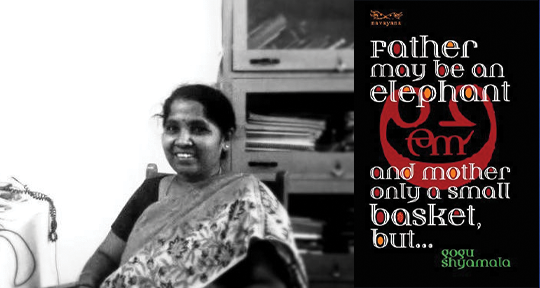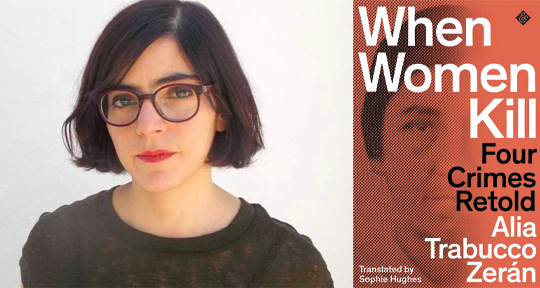Father May Be An Elephant and Mother A Small Basket, But… by Gogu Shyamala, translated from the Telugu by Diia Rajan, Sashi Kumar, A. Suneetha, N. Manohar Reddy, R. Srivatsan, Gita Ramaswamy, Uma Bhrugubanda, P. Pavana, and Duggirala Vasanta, Tilted Axis Press, 2022.
To read Gogu Shyamala’s Father May Be an Elephant, a landmark collection of twelve Dalit feminist stories translated from Telugu, is to uncover the gaping absence of women in Dalit literature. Rarely are stories exploring the intersections between feminism and Dalit experience translated into English. First published by Navayana, an anti-caste indie press based in New Delhi, the seminal stories are now distributed through another radical small press, Tilted Axis.
In the title story, children play in balmy, wet weather, shrieking with happiness as the clouds part to reveal a rainbow. A young girl waits for Mother, who has been “weeding the paddy fields all day.” Born in a house where musty dampness is etched into the soot-covered walls, she is used to seeing her family slog for hours. While a thunderous rain pours outside, the family members soothe one another, consoling and rubbing each other’s overworked backs. Father has lived away in the city for almost a year to earn back the money he was wrongly accused of stealing by the patel, a person belonging to a non-subaltern caste. On the rainy day he comes back, a tender joy spreads among the “orphaned birds.”
In his absence, the family survived on thick gruel, but to celebrate his return, Mother buys a kilogram of meat with chili and salt to make curry. The children relish the meal, roasting the meat over woodfire, content with full bellies. But when Father asks his wife for money to buy toddy, he is informed it was all spent to prepare the feast. Angered by her response, Father “beat her like she was cattle,” not stopping despite the wailing of the kids. “We were scared that he might beat us too if we went near him,” worries the panic-stricken protagonist, helplessly watching this violence along with her siblings. Father is ultimately berated by his own mother, who reminds him that it was his wife who took care of everyone while he was away. The title is a popular idiom—despite the elephant-like prowess of the father, the woman is the reason a family survives.



Radical Reading: Sara Salem Interviewed by MK Harb
I’ve increasingly thought more about what generous, kind, and vulnerable reading might look like instead.
At the height of the pandemic, I—like so many of us—looked for new sources of intrigue and intellectual pleasure. This manifested in finding Sara Salem’s research and reading practice, Radical Reading, which was a discovery of sheer joy; Salem views books and authors as companions, each with their own offerings of certain wisdom or radical thought. When she shares these authors, she carries a genuine enthusiasm that they might come with some revelation.
I interviewed Salem as she sat in her cozy apartment in London wrapping up a semester of teaching at the London School of Economics. We discussed our lockdown anxieties and our experiences with gloomy weather until we arrived at the perennial topic: the art of reading. The interview continued through a series of emails and transformed into a beautiful constellation of authors, novelists, and activists. In what follows, Salem walks us through the many acts of reading—from discussing Angela Davis in Egypt to radicalizing publications in her own work, in addition to recommending her own selections of radical literature from the Arab world.
MK Harb (MKH): Reading is political, pleasurable, and daring. Inevitably, reading is engaged in meaning-making. How did you arrive at Radical Reading as a practice?
Sara Salem (SS): Some of my most vivid childhood memories are of spending long afternoons at home reading novels, and when I think back to those novels, I find it striking that so many of them were English literature classics. I especially remember spending so much time reading about the English countryside—to the extent that today, when I am there, or passing it on a train, I get the uncanny feeling that it’s a place I know intimately. Later, when I read Edward Said’s writing on Jane Austen and English literature more broadly—its elision, erasure, and at times open support of empire—it struck me that we can often read in ways that are completely disconnected from the lives we live. This tension was what first opened up entire new areas of reading that completely changed my life, among which was the history of empire across Africa; at the time I was living in Zambia, where I grew up, and often visited Egypt. Critical history books were probably my first introduction to what you call the practice of radical reading, of unsettling everything you know and have been taught in ways that begin to build an entirely different world.
I like that you say reading is engaged in meaning-making, because it has always been the primary way in which I try to make sense of something. Even more recently, as I’ve struggled with anxiety, reading above all became my way of grappling with what I was experiencing: what was the history of anxiety, how have different people understood it, and how have people lived with it? I realise, of course, that not everything can be learned from a book, but so far, I’ve found that what reading does provide is a window into the lives of people who might be experiencing something you are, making you feel less alone.
MKH: How do you reconcile reading for pleasure versus reading for academic and political insights? Do they intersect? Being idle has its own spatial practice of radicality at times, and I’m curious on how you navigate those constellations.
SS: This question really made me think! In my own life, I have always made the distinction of fiction as pleasure and non-fiction as academic/work-related. So, if I need to relax, or want to take some time off, I will instinctively reach for fiction, and if I want to start a new project, I think of which academic texts would be helpful. However, this began to change about five or six years ago, when I began to think more carefully about how fiction speaks to academic writing and research, as well as how non-fiction—unrelated to my own work—can be a great source of pleasure and relaxation. This has meant that they have begun to intersect much more, and it has enriched both my academic work and my leisure time. READ MORE…
Contributor:- MK Harb
; Language: - Arabic
; Places: - Egypt
, - Zambia
; Writers: - Ahdaf Soueif
, - Arwa Salih
, - Huda Tayob
, - Mahmoud Darwish
, - Sonallah Ibrahim
, - Thandi Loewenson
, - Waguih Ghali
; Tags: - intersectional feminism
, - migration
, - Race
, - radicalism
, - Reading
, - sexuality
, - social commentary